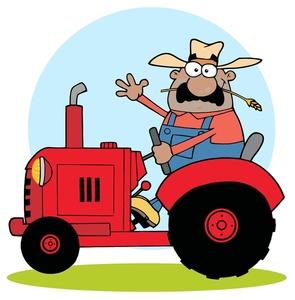A Smile, a Wave, and a Nod
I write a weekly column for a local newspaper, that's centered around my home community. When there's no community news for me to share, however, I write about other things. Here is one of my recent columns. I hope you like it.
In C. S. Lewis' classic book The Lion, the Witch, and the Wardrobe, the young heroine Lucy enters the magical land of Narnia where she soon meets a faun named Mr. Tumnus. “Pleased to meet you, Mr. Tumnus. I'm Lucy Pevensie”. She holds out her hand to the faun, who looks at it curiously. “Oh, you shake it,” she explains. “Why?” inquires Mr. Tumnus. “I … I don't know,” is her honest reply.
Later on, her older brother Peter encounters a large beaver, not yet understanding that the animals in this strange world can talk. “Here, boy,” he says, holding out his hand to the beaver. “Tsk, tsk, tsk.” Mr. Beaver stares at his hand for a moment, then says, “I ain't going to smell it, if that's what you want”.
Holding out our hands in form of greeting originated a very long time ago – around the 5th century A.D. Shaking the hand of another person, especially a stranger, demonstrated that neither person was carrying a weapon with which to harm the other. Over time, the gesture evolved into a polite greeting in European cultures.
Other cultures avoid touching hands for various reasons, most having nothing to do with hygiene. Transfer of good or bad energy seems to be a main concern, along with seeming to be in agreement with the person's ideology by shaking his or her hand. And I've always wondered about the custom of extending the "right hand of fellowship" when people greet one another. What about those people who are left-handed?
When people who live in the South, or in the country, greet each other as they are passing (and not close enough to shake hands), a hand is often raised in a wave, or at least a finger is lifted in acknowledgment. Sometimes the gesture is reduced to a nod of the head. The number of times people pass each other within a given time frame dictates how this is done, as well.
Consider, for example, Farmers Fred and Ted. Fred drives by Ted's farm and sees Ted on his tractor. Fred raises a hand and waves a hearty greeting, which Ted returns. A little while later, Fred returns from his errands and sees Ted again. When they make eye contact, Fred smiles and nods, and Ted raises a finger and nods back. Later on in the day, Fred realizes he needs something else from the store, and as he drives back by Ted's farm he simply nods at Ted and Ted pretends not to notice. On Fred's return trip, he takes a longer route to avoid driving by Ted once again. Silly, but true.
In more recent years, the handshakes, waves, and even nods seem to have fallen by the wayside. A person will wave at another in passing, and the recipient of the greeting will often simply stare in response. Not a very friendly response, if you ask me. Why people have moved away from basic greetings is beyond me. And don't get me started on the death of what used to be common courtesy, with the use of "pardon me" or "excuse me".
We live in the Hospitality State, so why not live in a state of hospitality? What's your state of mind, neighbor?
As I leave you, know that I am smiling and waving at you. Please wave back.
Consider, for example, Farmers Fred and Ted. Fred drives by Ted's farm and sees Ted on his tractor. Fred raises a hand and waves a hearty greeting, which Ted returns. A little while later, Fred returns from his errands and sees Ted again. When they make eye contact, Fred smiles and nods, and Ted raises a finger and nods back. Later on in the day, Fred realizes he needs something else from the store, and as he drives back by Ted's farm he simply nods at Ted and Ted pretends not to notice. On Fred's return trip, he takes a longer route to avoid driving by Ted once again. Silly, but true.
In more recent years, the handshakes, waves, and even nods seem to have fallen by the wayside. A person will wave at another in passing, and the recipient of the greeting will often simply stare in response. Not a very friendly response, if you ask me. Why people have moved away from basic greetings is beyond me. And don't get me started on the death of what used to be common courtesy, with the use of "pardon me" or "excuse me".
We live in the Hospitality State, so why not live in a state of hospitality? What's your state of mind, neighbor?
As I leave you, know that I am smiling and waving at you. Please wave back.

Comments
Post a Comment